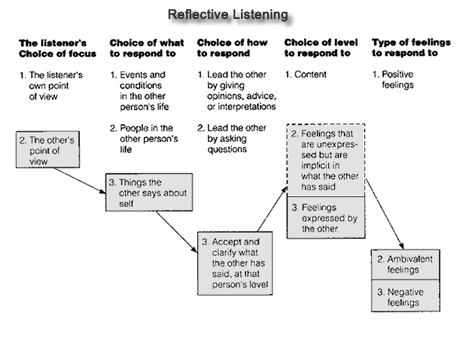- POPULAR ARTICLES
- Thank You Words
- Retirement Wishes
- Face to Face
Reflective Listening
Reflective Listening is the most advanced form of active listening. Its basic premise is that the speaker knows best what his/her experience is, and the role of the listener is to reflect the experience back to the speaker, to mirror it.
How do you reflect? You tune in to people’s words, nonverbal messages, and mood. You listen in a non judgmental way and then mirror what the speaker is saying and feeling using your own words.
The reflection of words and emotions makes the person feel understood and him/her a space to get to the bottom of his feelings and his experience.
The following chart is adapted from Communication in Organizations, by Dalmar Fisher. The chart shows the options the listener has in a conversation, and how a reflective listener would chose (shaded boxes).

Elements of Reflection
Actively engaging in the conversation. This calls for reducing or eliminating distractions of any kind to allow for paying full attention to the conversation at hand.
Genuinely Empathizing with the speaker’s point of view. This doesn’t mean agreeing with the speaker, just viewing things from his/her perspective. The listener encourages the person to speak freely, by being non judgmental and empathetic.
Mirroring Mood of the speaker, reflecting the emotional state with words and nonverbal communication. This calls for the listener to quiet his mind and fully focus on the mood of the speaker. The mood will be apparent not just in the words used but in the tone of voice, in the posture and other nonverbal cues given by the speaker.The listener will look for congruence between words and mood.
Summarizing what the speaker said, using the listener’s own words. This is different than paraphrasing, where words and phrases are moved around and replaced to mirror what the speaker said. The reflective listener recaps the message in his own words.
An example
Tom: I wonder why Laura got a bigger raise than me. She's been with the company a lot less time than me, and she hasn't done anything significant to merit a raise.Listener: You think Laura should have gotten a smaller raise.
Notice how the person listening did not question the validity of Tom's feelings, the listener just reflected in his own words what he heard.
Tom's possible reactions are: (a) He feels understood and free to explore the subject more in depth or (b) He feels discovered and may try to deny to the listener and to himself his feelings of jealousy.
Whatever reaction Tom has, the listener continues mirroring what he hears, helping the speaker sort out his own experience. If the person speaking gets defensive, the listener remains non-judgmental, hoping to open up the space for true communication.
When a person listens without passing judgment, it frees up others to be authentic, to express themselves and to accept who they truly are.
The premise of Reflective Listening is that the speaker knows best what he/she is experiencing, the listener helps the speaker see it by reflecting it back as a mirror would.
This listening creates a space for the deepest and most effective communication between two people to take place.
Learn more about Listening Skills




